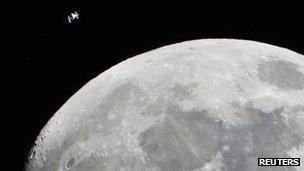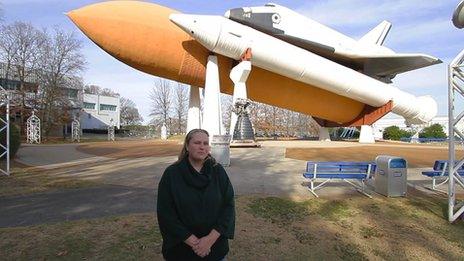Newt's long shot at the Moon
- Published
- comments
Newt Gingrich: "By the end of 2020, we will have the first continuous propulsion system in space capable of getting to Mars in a remarkably short time"
Newt Gingrich's promise to build a base on the Moon, external by 2020 if he becomes president shows the best and worst of the man.
It is grandiose, ill thought-out and obvious electioneering, but it's also thinking outside the narrow box.
For the political box has become very small indeed.
The parties are very far apart, but they are photographic negatives of each other, arguing about the great issue of the 20th Century: taxation and the size of the state.
Newt, in this instance, is thinking about the challenges of this century and those beyond it. It is true he was speaking in a state with a heavy investment in the space race, but the final frontier has been a long-standing obsession for him, external.
More than sci-fi
America's Moon shots were the symbol of its boundless quest for the future, but now politicians who talk about space risk mockery.
What was once a sign of modernity and progress is now often seen as plain foolish and geeky. That was the fate of British Liberal Democrat Lembit Opik, who was widely mocked for his talk about protecting the Earth from asteroids.
Because people had seen silly films about an asteroid strike, they seem to bracket the threat alongside giant marshmallow men, external.
Perhaps it is the fault of bookstores for pulling Fantasy and Sci-Fi into one category: I like both, but elves and magic swords don't exist, while the solar system and the stars do.
As every lover of speculative fiction knows, if the human race is to flourish, then one day it will have to take to the stars, external.
But the trouble is the same as the asteroid strike. We are talking about something that could be hundreds of years away, if not thousands, when most politicians and voters can't think more than four years ahead.
Small government, big space?
But if Newt's forward thinking is in some ways admirable, it is odd territory at the end of an economic crisis, for a politician whose main theme is cutting government spending and decreasing the power of the state.

The Moon was once a powerful symbol for the US and a future goal for the Chinese
It is true he has always been interested in encouraging private space exploration and thinks 10% of Nasa's budget, external should be given out in prize money for the best ideas.
But getting to the Moon and maintaining a base would be immensely costly. One 2009 estimate, external worked out it would cost $35bn (£22bn) to set up a base and around $7.5bn a year to maintain it. It is hard to see that happening without massive government support.
One scientist told the BBC that it could cost 5% of the federal budget, as Apollo did.
Sell that to the Tea Party.
China's space race
The idea of a Moon base is controversial, even among those who urge space exploration, external.
It would be hugely expensive and would halt other, perhaps more exciting, unmanned projects further out in the solar system. It would only conceivably pay its way as a source of Helium 3. But that depends on scientists making a breakthrough in nuclear fusion.
But here's what is probably going to happen, if not under President Newt: sometime this century, the Chinese will put a man (or woman) on the Moon, external.
And that's just for starters. The country has recently declared Mars within their ambitions.
For the Chinese, the space race makes a point about their place in the world, It helps grow new industries, fits their ideology of human progress and gives them a military edge.
The Americans landed on the Moon precisely because they were given a jolt by the Soviet Union's Sputnik programme. The rival superpower had done something they couldn't yet do.
Imagine if the rising power does something America did long ago, but can no longer do. That too would be a powerful symbol. Then a president might have to dig out Newt's blueprints - or accept second place in the world.
- Published18 January 2012
